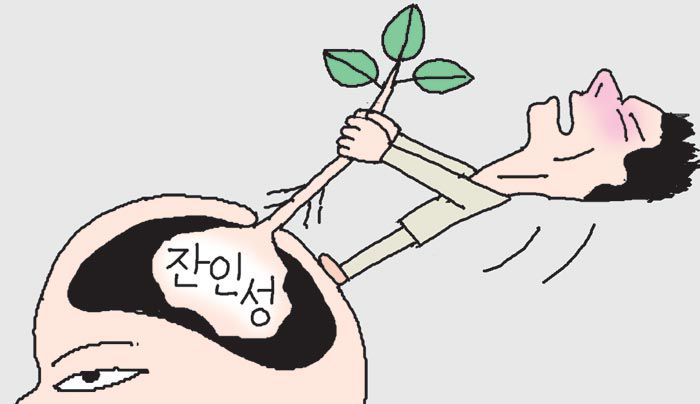(조선일보 2018.11.01 윤희영 편집국 편집위원)
인간(human beings)은 어찌 그리 잔인할까(be cruel).
인간이 인간에게 어떻게 그리 비인간적일(be inhumane) 수 있는 걸까.
어째서 서로 그토록 잔혹하고 무자비한(be vicious and merciless to each other) 건가.
예일대 심리학과 폴 블룸 교수는 "누구나 정상 상황에서도(under the right circumstances) 충격적 잔혹 행위를
저지를 수 있다(be capable of committing staggering atrocities)"고 말한다.
"나치가 유대인을 절멸하려(exterminate Jews) 한 것은 자유·존엄성, 심지어 삶에 대한 권리조차 없는
'물건'(objects without the right to freedom, dignity, or even life itself)으로 여겼기 때문"이라는
종래의 설명(conventional explanation)으로는 설명이 안 된다고 지적한다.

그에 따르면 잔혹성이 인간성 말살에서 비롯되는(come from dehumanization) 것이라는 해석은 막연하다(be vague).
대량 학살과 노예 제도, 모든 악(genocide, slavery and all sorts of evils)은 사람을 사람으로 보지 않는 탓이다.
다른 사람에게 야만적이고 흉포한 짓을 가하는(do savage and heinous things to another person) 것은
목적 달성을 위한 '수단적 폭력'(instrumental violence)일 뿐이라고 합리화한다.
인간은 사회 계급과 인정·존중 욕망에 민감하다(be sensitive to social hierarchies and to a desire for approval
and esteem). 거기에 어두운 면(ugly side)이 내재해 있다.
물리적으로 다른 사람을 지배해 존경을 얻으려 하니까(earn respect by physically dominating people) 파괴적이 된다.
단순히 다른 사람의 고통을 지켜보며 쾌락을 즐기는 사이코·가학성 변태·괴물(psychopath, sadist or monster)로
치부해버리면 안 된다. 훨씬 복잡하다(be far more complicated).
사람은 끔찍한 행위를 하도록 조작될(be manipulated into doing horrible things) 수도 있다.
나치 독일은 도덕의 깊은 구렁에 빠져들었다(be led into a moral abyss).
지금은 누구나 당시의 광기 어린 시기를 회상하며(look back on the moment of insanity) "나는 동참하지 않았을
(could never have taken part in it) 것"이라고 단언한다. 그러나 당시였다면 상당수가 의인(義人·righteous person)과
영웅을 자처하며 가담했으리라는 것이 추악하고 불편한 진실(ugly and inconvenient truth)이다.
서로 잔인해지지 않으려면 권력과 명예에는 덜 강박적이고(be less obsessed with power and honor)
배려심과 존엄성에는 더 신경 쓰는(be more concerned with thoughtfulness and dignity) 사회를 만들어야 한다.
그래야 군림하고 앙갚음하려는 잔혹한 욕구를 잠재울(quell the atrocious appetites for dominance
and retaliation) 수 있다.
'人文,社會科學 > 時事·常識' 카테고리의 다른 글
| [알쓸신세] 세계 최대높이 인도 동상 뒤에 '역사 정치' 싸움 있다 (0) | 2018.11.05 |
|---|---|
| 이 늪의 매력에.. 세계가 또 한 번 빠졌다 (0) | 2018.11.03 |
| 김문수 "박정희에 침 뱉던 내가 이제는 꽃을 바친다" (0) | 2018.10.27 |
| [알쓸신세] "뛰면 자궁 떨어져" 사우디 같던 美 금녀의 벽 (0) | 2018.10.26 |
| [윤희영의 News English] 옥스퍼드大의 난해한 입시 면접 문제 (0) | 2018.10.25 |